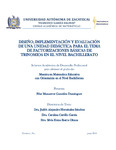
Please use this identifier to cite or link to this item:
http://ricaxcan.uaz.edu.mx/jspui/handle/20.500.11845/1172Full metadata record
| DC Field | Value | Language |
|---|---|---|
| dc.contributor | 863607 | es_ES |
| dc.contributor.advisor | Judith Alejandra Hernández Sánchez | es_ES |
| dc.contributor.author | Carolina Carrillo García | es_ES |
| dc.contributor.author | Silvia Elena Ibarra Olmos | es_ES |
| dc.coverage.spatial | Zacatecas, México | es_ES |
| dc.creator | Gonzalez Dominguez, Pilar Monserrat | - |
| dc.date.accessioned | 2019-10-10T18:18:13Z | - |
| dc.date.available | 2019-10-10T18:18:13Z | - |
| dc.date.issued | 2019-06-27 | - |
| dc.identifier | info:eu-repo/semantics/publishedVersion | es_ES |
| dc.identifier.uri | http://ricaxcan.uaz.edu.mx/jspui/handle/20.500.11845/1172 | - |
| dc.description | The practice of the teacher and his training have become in recent years topics of interest for Mathematics Education, considering them as factors that affect the teaching and learning of mathematics. However, it is known that some mathematics teachers were not trained with the basic knowledge or practical skills necessary for the development of an efficient class. Some of these teachers, as in my case, choose to build them through training programs and professional development spaces. In this way, the present study describes the experimentation of the design, execution and evaluation of a didactic unit with the support of a didactic material for the theme of Basic Trinomial Factorizations for the Baccalaureate level. These practices were supported by the theoretical-methodological framework of didactic analysis, with the aim of contributing to the management of theoretical-methodological tools that support them. In this case the Factorization theme was chosen for the relationships it establishes with subsequent educational levels; in addition, to be a subject that is complicated to teach the teacher in question. The use of didactic material is a decision of the teacher to support her instruction process and build knowledge in the management and implementation of these resources. Derived from this experience, it was possible to verify that the factorization of trinomies is a subject that the students see as the set of rules and algebraic operative procedures (symbolic representation), without considering the meaning of the equivalence between expressions as the central focus of this topic. In addition, there were difficulties with the geometric representation of these methods through the didactic material and the application of the methods in the solution of problems. This experience will allow the teacher to present aspects of improvement that could focus on future teaching processes. In this way, evidence of the construction of specialized professional knowledge is given and, therefore, it is expected to have a more efficient teaching practice. | es_ES |
| dc.description.abstract | La práctica del profesor y su formación se han convertido en los últimos años en temas de interés para la Educación Matemática, considerándolos en factores que inciden en la enseñanza y el aprendizaje de las matemáticas. Sin embargo, es sabido que algunos profesores de matemáticas no fueron formados con los conocimientos base ni las habilidades prácticas necesarias para el desarrollo de una clase eficiente. Algunos de estos profesores, como en mi caso, eligen construirlos a través de programas de formación y espacios de desarrollo profesional. De esta manera, en el presente estudio se describe la experimentación del diseño, ejecución y evaluación de una unidad didáctica con el apoyo de un material didáctico para el tema de Factorizaciones Básicas de Trinomios para el nivel Bachillerato. Estas prácticas fueron sustentadas mediante el marco teórico-metodológico del análisis didáctico, con la finalidad de contribuir en el manejo de herramientas teórico-metodológicas que las sustenten. En este caso se eligió el tema de Factorización por las relaciones que establece con niveles educativos posteriores; además, de ser un tema que se le complica enseñar a la profesora en cuestión. El uso de material didáctico es una decisión de la profesora para apoyar su proceso de instrucción y construir conocimientos en el manejo e implementación de estos recursos. Derivado de esta experiencia, fue posible comprobar que la factorización de trinomios es un tema que los estudiantes ven como el conjunto de reglas y procedimientos operatorios algebraicos (representación simbólica), sin considerar el significado de la equivalencia entre expresiones como foco central de este tema. Además, se presentaron dificultades con la representación geométrica de dichos métodos a través del material didáctico y la aplicación de los métodos en la solución de problemas. Esta experiencia permitirá a la profesora dar a conocer aspectos de mejora en los que podría enfocarse en procesos de enseñanza futuros. De esta manera se da evidencia de la construcción de conocimiento profesional especializado y por ende se espera contar con una práctica docente más eficiente. | es_ES |
| dc.language.iso | spa | es_ES |
| dc.publisher | Universidad Autónoma de Zacatecas | es_ES |
| dc.relation.isbasedon | Maestría en Matemática Educativa con Orientación en el Nivel Bachillerato | es_ES |
| dc.relation.uri | generalPublic | es_ES |
| dc.rights | Atribución-NoComercial-CompartirIgual 3.0 Estados Unidos de América | * |
| dc.rights.uri | http://creativecommons.org/licenses/by-nc-sa/3.0/us/ | * |
| dc.subject.classification | HUMANIDADES Y CIENCIAS DE LA CONDUCTA [4] | es_ES |
| dc.subject.other | desarrollo profesional | es_ES |
| dc.subject.other | análisis didáctico | es_ES |
| dc.subject.other | material didáctico | es_ES |
| dc.subject.other | conocimiento profesional | es_ES |
| dc.subject.other | formación del profesor de matemáticas | es_ES |
| dc.title | Unidad didáctica con el uso de un material didáctico para el tema de factorizaciones básicas de trinomios en el nivel bachillerato | es_ES |
| dc.type | info:eu-repo/semantics/masterThesis | es_ES |
| Appears in Collections: | *Tesis*-- UA Matemáticas | |
Files in This Item:
| File | Description | Size | Format | |
|---|---|---|---|---|
| 2019 González, P.M..pdf | Tesis de González 2019 | 3,09 MB | Adobe PDF |  View/Open |
This item is licensed under a Creative Commons License
